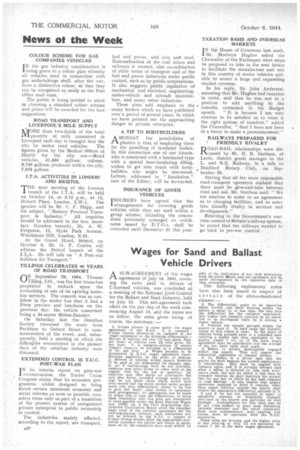Wages for Sand and Ballast Vehicle Drivers
Page 22

If you've noticed an error in this article please click here to report it so we can fix it.
1-1 A SLTB-AGREEMENT of the wages agreement of July 14, 1941, covering the rates paid to drivers of C-licensed vehicles, was concluded at a meeting of the National Joint Council for the Ballast and Sand Industry, held on July 12. This sub-agreement took effect on the pay day of the week commencing August 14, and the terms are as follow, the rates given being, of course, the minimum:— 1. C-class drivers to come under the wages agreement of the N.J.C. 2. A categoryC-class licence drivers—to be ineluded In the wages agreement at the following 'differentials:— Drivers of vehicles not over 12 tons gross. 3etei. per hour; of vehicles over 12 tons gross, 5d. per hour. S. A eategory—drivers of service (repair) vans—to be Included at a differential of 2d. per hour. 4. Wages payable to be determined by N.J.C. wages agreement classifications applicable to the point of pick-up.
5. Drivers of vehicles within quarry premises In be paid at the differential for dumper risen.
6. (a) it road-haulage work be not available, employer may place driver on other work at the regular rate for the job in question; ibl employer may offer driver an alternative dat rate plus bonus, provided average week's earnings be not below those whirl would have
• been earned had the driver worked under normal basic rate plus differentials; driver to be free to give two weeks' clear notice to terminate sea arrangement: fe) application can be made by either side to vary the differentials, to bring them reasonably into line with any alterations in rates payable under the Road Haulage Wages Act, 1936; WI if the Civil Engineering Construotion Coneiliation Board alters the classified baste rates of the national agreement for the civil-engineering industry, ouch alterations will not be followed by the N.J.C. In respect of C-class licence drivers until the appropriate committee considers the matter and comes to agreement on it; the committee must meet within 10
dale of the declaration of any such alterations from the above Beard, and any agreement will be made retrospective to the operative date of that alteration.
The following explanatory notes have also been issued in respect of c c r tai n of the above-mentioned clauses:—
5. The differentials apply to an operative whose normil late while working within the quarry is equal to, or less than, the rate plus the differential for the category mentioned. Any higher rate normally received by an operative to be maintained while he is driving a repair vehicle.
4. Vehicles are usually garaged within the quarry or near it. In such cases the interpretation of this Clause it clear. In the event of vehicles being garaged away in a classified area carrying a lugher rate than applicable to the quarry, clause 7 (1) (c) of the main wages agreement shalt be appropriate and the average of the two basic rates shall apply.
5. Refers. to drivers permanently engaged within the quarry. They will receive the differential applicable to dumper drivers. 6. (al Refers to a driver sent into the euarry for work because his normal employment is unavailable. This must be applied with common sense, and it is strongly advised that when a +Myer is directed to take such alternative work, the rate for which is less than he normally receives, he shall maintain his normal rate for any day On which he has been engaged on road haulage_' It also implies that quarry operatives requiredto drive C vehicles, other than repair vehicles, outside the quarry shall receive the appropriate differential outlined in 2.
5 and 6 la) are not intended to apply to operatives seasonly or frequently engaged part-time in the, quarry and part-time on road haulage. Arrangements for this class may be at any timesubject to feint local discussion between employer and theunion concerned. Such local arrangements, both existing and future, must be registered with the N.J.C. secretaries.
These rates are minima, and the higher rates of pay existing at July 12 are protected by cause 7 (4) of the main wages agreement.




















































